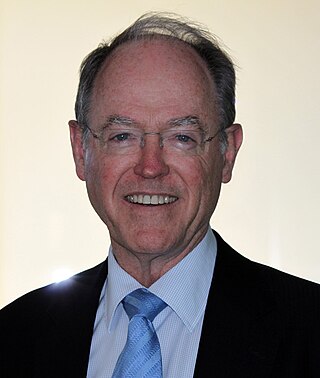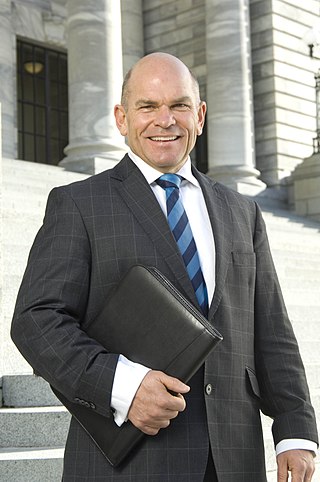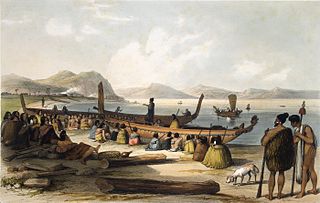
Donald Thomas Brash is a former New Zealand politician who was Leader of the Opposition and leader of the New Zealand National Party from October 2003 to November 2006, and leader of the ACT New Zealand party for seven months from April to November 2011.

Donna Lynn Awatere Huata is a former member of the New Zealand Parliament for the ACT New Zealand Party and activist for Māori causes.
The New Zealand foreshore and seabed controversy is a debate in the politics of New Zealand. It concerns the ownership of the country's foreshore and seabed, with many Māori groups claiming that Māori have a rightful claim to title. These claims are based around historical possession and the Treaty of Waitangi. On 18 November 2004, the New Zealand Parliament passed a law which deems the title to be held by the Crown. This law, the Foreshore and Seabed Act 2004, was enacted on 24 November 2004. Some sections of the Act came into force on 17 January 2005. It was repealed and replaced by the Marine and Coastal Area Act 2011.

Rodney Philip Hide is a former New Zealand politician of the ACT New Zealand party. Hide was a Member of Parliament for ACT from 1996 until 2011, was ACT's leader between 2004 and 2011, and represented the Epsom constituency from 2005 to 2011. In the Fifth National Government, Hide was Minister of Local Government, Associate Minister of Commerce and Minister of Regulatory Reform until 2011.

The 2005 New Zealand general election on Saturday 17 September 2005 determined the membership of the 48th New Zealand Parliament. One hundred and twenty-one MPs were elected to the New Zealand House of Representatives: 69 from single-member electorates, including one overhang seat, and 52 from party lists.

The 47th New Zealand Parliament was a term of the Parliament of New Zealand. Its composition was determined by the 2002 election, and it sat until 11 August 2005.
A list MP is a member of parliament (MP) elected from a party list rather than from a geographical constituency. The place in Parliament is due to the number of votes that the party won, not to votes received by the MP personally. This occurs only in countries which have an electoral system based wholly or partly on party-list proportional representation.

The Orewa Speech was a speech delivered by the then-leader of the New Zealand National Party Don Brash to the Orewa Rotary Club on 27 January 2004. It addressed the theme of race relations in New Zealand and in particular the status of Māori people. Brash approached the subject by advocating 'one rule for all' and ending equitable measures and affirmative action for Māori, which he described controversially as "special privileges".

Rove, also titled Rove Live, was an Australian television variety show that featured live music performances and interviews with local and international celebrity guests. The program premiered on the Nine Network on 22 September 1999, before moving to Network Ten which aired the program from 2000 until November 2009. The show was hosted by comedian Rove McManus through his production company Roving Enterprises, and featured an ensemble cast who presented various segments throughout the course of the show. The show won the Logie Award for "Most Popular Light Entertainment Program" five times.
Kenneth Xiaoxuan Wang is a former Deputy Leader of the ACT New Zealand party.

Māori politics is the politics of the Māori people, who were the original inhabitants of New Zealand and who are now the country's largest minority. Before the arrival of Pākehā (Europeans) in New Zealand, Māori society was based largely around tribal units, and chiefs provided political leadership. With the British settlers of the 19th century came a new British-style government. From the outset, Māori sought representation within this government, seeing it as a vital way to promote their people's rights and improve living standards. Modern Māori politics can be seen as a subset of New Zealand politics in general, but has a number of distinguishing features, including advocacy for indigenous rights and Māori sovereignty. Many Māori politicians are members of major, historically European-dominated political parties, but several Māori parties have been formed.
The following lists events that happened during 2005 in New Zealand.

In New Zealand politics, waka-jumping is a colloquial term for when a member of Parliament (MP) either switches political party between elections or when a list MP's party membership ceases.

Pulp Sport was a New Zealand television show that mixed sport with various styles of comedy. The hosts Jamie Linehan and Ben Boyce acted under their respective pseudonyms Bill and Ben, performing a half-hour of various sports based skits. They were usually accompanied by an anthropomorphic fox mascot.
The following lists events that happened during 1949 in New Zealand.
Ngā Tamatoa was a Māori activist group that operated throughout the 1970s to promote Māori rights, fight racial discrimination, and confront injustices perpetrated by the New Zealand Government, particularly violations of the Treaty of Waitangi.
Michael Noel James Hosking IV is a New Zealand television and radio broadcaster who has worked for Radio New Zealand and TVNZ and from 2008 has been the weekday breakfast host on Newstalk ZB with "The Mike Hosking Breakfast". He is a supporter of the centre-right National party and is often openly critical of the Labour-led government. He has lived and worked as a broadcaster in Wellington, Christchurch and currently resides in Auckland.
Ngāti Hine is an iwi with a rohe in Northland, New Zealand. It is part of the wider Ngāpuhi iwi.

Arapeta Marukitepua Pitapitanuiarangi Awatere was a New Zealand interpreter, military leader, maori welfare officer, and local politician. Of Māori descent, he identified with the Ngati Hine (Northland), Ngati Porou and Te Whanau-a-Hinetapora iwi. He was born in Tuparoa, East Coast, on 25 April 1910. He served as a colonel in the Māori battalion during the Second World War and is father to the former MP Donna Awatere Huata.
Tama Tūranga Huata was a Māori performing arts leader in New Zealand.